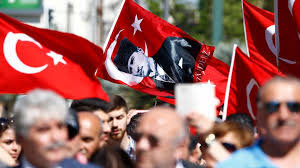Hawzah News Agency - In recent weeks, the German Parliament discussed a controversial proposal to ban a movement it calls the Grey Wolves, which appears to be inspired by France’s ban of Muslim associations across the country.
The only problem for banning such a group is that there is no such organization called the Grey Wolves in either Germany or France. In European usage, apparently, the Grey Wolves refer to a Turkish nationalist movement with connections to Turkey’s Nationalist Movement Party (MHP), but that movement has never described itself as the Grey Wolves.
While Turkish nationalists like to use the sign resembling a wolf, there has been no prominent nationalist organization which has called itself Grey Wolves since the emergence of a pan-Turkic movement in the early 20th century in the Ottoman Empire.
Since the 1960s, the movement has been known as Ulkucu Hareket in Turkish, which means the Idealist Movement. Across Turkey and Europe, where significant populations of a Turkish diaspora live, there have been various groups that go by the name of Idealists but not as the Grey Wolves.
Before Germany’s discussion of the movement, France also declared a ban on the Grey Wolves, eliciting condemnation from Turkey, which called it an “imaginary decision”.
“There is no organization with the name of the Grey Wolves in the world. There is no such group in Germany or France or Belgium or the Netherlands or Austria, etc. I am naming all these countries because the Netherlands also made a decision like France on Tuesday,” said a Frankfurt-based leader of Germany’s Idealists.
At the end of the German Parliament discussions, there was no banning of the Grey Wolves or Idealists or anything like that, says the leading German-Turkish voice - who wishes to remain anonymous - and who has close connections to both German and Turkish authorities.
The parliament’s decision was to advise the government to keep a close eye over the Grey Wolves and any other groups associated with the “imaginary” group, the source says, indicating that despite the efforts of some anti-Turkish groups in Germany, there was no banning in legal terms.
A deliberate public campaign against Islam
The anonymous TRT World source thinks that behind all the banning efforts, there is a deliberate smear campaign to undermine Muslims’ standing in European countries, creating a perception that the Islamic faith inspires terrorist acts.
“There is no one, who was convicted with any terrorism charges in Germany or other European countries, being associated with Idealists or the Grey Wolves,” he said.
As a result, he strongly believes that banning efforts are part of an anti-Muslim campaign across the continent. “I don’t think we can even talk about Islamophobia anymore. Islamophobia means the fear of Islam. But these efforts are directly against Islam in their nature,” he said, referring to Macron’s recent statements.
“His interior minister feels so much pride to close down 43 mosques across France in the name of fighting so-called Islamic terrorism. These measures are not against terrorism. They are the measures against the right to worshipping for any particular religion,” the source said.
France’s aggressive interior minister, who compared Muslim immigrants in Europe to ‘barbarians’ at one point, has also ordered the closure of the country’s biggest Muslim civil society organisation, which documents racist and Anti-Muslim attacks.
When Macron was speaking out against France’s Muslims last month, there was also a police raid on a large mosque, Mevlana Mosque, in Berlin, the German capital.
“They entered the mosque with their combat boots at 6:00 AM in the morning,” the source said, referring to the incident as a provocative act against the country’s peaceful Muslim community.
The Idealists, or the Grey Wolves according to European understanding, are overwhelmingly Turks. “But a close examination of recent attacks in France and Europe would show that no Turkish national or person with Turkish origin has been involved in those terrorist attacks,” said Bulent Guven, deputy chairman of the International Democrats Union in Germany.
“As a result, I believe what they call Islamophobia indeed amounts to an enmity toward Turkishness, [going back to the Ottoman times],” Guven, who is not originated with the Idealist movement, .


Your Comment